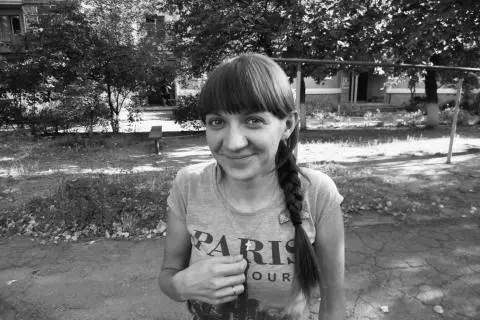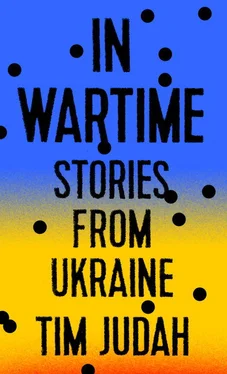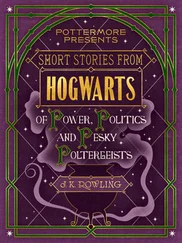
Viktoria Demidchenko. Sloviansk, September 2014.
She lives on the ground floor of a classic run-down, five-story block on the edge of town that people had begun moving into in 1971. When I first met her she served strawberry tea. In the corridor she has wallpaper depicting a New York street scene with yellow cabs. Just below the kitchen window are flowerbeds, carefully maintained by the inhabitants of the block, and in front of them is a place for children to play. During the period the rebels were here, if the mothers heard any fighting they popped their heads out of the windows and yelled at their kids to come in.
Viktoria’s fridge is decorated with magnets of places she or friends and family have been, which are mostly, but not only, in Ukraine. In 2008 Viktoria went for six weeks to Germany to pick strawberries near Cologne with a group from her college, organized by one of her teachers. She was paid €5 an hour, earned €1,500 and bought a laptop. She has a husband and a daughter, aged two and a half. Before having her child, Viktoria could not get a proper job. She had studied at the nearby teacher training college, but the problem was that you had to pay a bribe to get a teacher’s job and she did not have that money. When the fighting began, the furniture factory where her husband worked shut, and he was not getting paid. As elsewhere in Ukraine before the war, the problem was less one of unemployment and rather one of low pay. She explained to me in minute detail exactly how much she had to pay for gas, for electricity, for water and for her contribution to the apartment block charges. The sums were tiny, but the reality was that she and her husband now had less than €15 left.
As we drank the strawberry tea, Viktoria asked me what life was like in Britain. Did we, for example, have to bribe someone to get a job? Did we have to pay a bribe to get into university? The conversation moved on to Rinat Akhmetov. I said that I often passed One Hyde Park, the luxury London block where he had bought two flats and where his wife and children lived. The Guardian reported that according to Land Registry documents in April 2011, he had paid £136.4 million for the properties and was expected to spend another £60 million to get his 2,300 square meters the way he wanted them. Viktoria’s flat was about 30 square meters. As to the future of Sloviansk, she said: “It does not matter if I live in Russia or Ukraine. All I want is a good salary. Now I can’t even afford a new pair of shoes. I don’t want to be anxious about money for bread.” What concerned her most right now, apart from the risk of fighting, was that she had heard that the meager state maternity leave pay she got was about to end (which it duly did) because Ukraine was bankrupt.
Another time, when some of her friends came over, we went for a walk in the nearby allotments, which many in the apartments had, and in which some neighbors were tending their vegetables. Viktoria’s parents-in-law had an allotment here. We looked at where some sort of missile had made a hole clean through the trunk of a tree by the fire station. By the line of old car tires with which the rebels had blocked the road, there was a big flower bed with two life-size, painted plaster models of children. One was a girl in a yellow dress with a blue collar and belt—that is to say, in the Ukrainian national colors—who was watering the plants with a red watering can. The other was a blond boy in a red shirt reading a book, who, according to Viktoria and local lore, was supposed to be young Lenin. Between them was a giant red toadstool with white spots. A few paces away was a building the local rebels were using as their HQ.
At their barricade here, close to the entrance to the allotments, the men had made themselves a comfortable shelter with a table and chairs. A few of them had guns, but many did not. On the table was a vase of flowers. As we sat there, a couple came by walking their dachshund, who was called Rich. They had come to drop off some picnic plates and napkins. These were added to the other supplies, including cigarettes, biscuits and salads that the residents of the blocks of apartments on the other side of the tree-lined street had brought them. Suddenly a car drove up and three local men got out with musical instruments. They were touring the barricades. They began to sing. A line from one song from the Second World War went: “Under Balkan stars I will dream of my Smolensk!” A line from another, from the Afghan war, was: “Under the stars of Jalalabad, we cursed our damned war…”
Then something happened. All the men jumped up, got into their cars and roared off. Two suspicious men had been spotted on a nearby roof. Everyone seemed to believe that the town had been infiltrated by snipers (some of them women) and other evildoers from Right Sector, one of the post-Maidan nationalist volunteer militias. Indeed many believed that the town was surrounded by Right Sector men pretending to be soldiers, an idea encouraged by the fact that, thanks to the chaotic situation then prevailing in the Ukrainian military and in the newly created National Guard, men from the latter were on checkpoints outside town, in black uniforms with no insignia, because, as one explained, they had not been made yet. Ten minutes later the men from the barricade were back. The two men had been sent from the municipality to repair something.
The local commander was called Yevgeniy. He was thirty-five years old and before the war had a small delivery-van business. He did not want to give his surname. “What do they want?” he raged. “We were peaceful people until they,” by which he meant Ukrainian forces, “came here.” A friend of his, in fact the godfather of his child, he said, had been mobilized into the National Guard on the other side, “and they tell them it’s only terrorists here!” The men at the barricade nodded. This was a common theme at the bottom of the rebel pecking order. They were just ordinary folk who, appalled by the fall of Viktor Yanukovych, and convinced by the Russian media and the high profile of small groups like Right Sector on the other side that this was somehow a rerun of the Second World War and they were about to be overrun by the (new) Nazis. Yanukovych had not done anything for them, and like most politicians was considered a son of a bitch, but at least, as he was from around these parts, they could consider him their son of a bitch. Still, opinion polls had consistently shown that the majority did not want to become part of Russia, but now, as drama engulfed Ukraine, many like Viktoria were just fed up and desperate. And so, with the close ties of language, family and business, and in places like Donetsk with its particularly marked Soviet demographic legacy, it was only logical that people might look to Russia rather than the West and an EU which is distant—in a way which it is not if you live in, say, Lviv.
Two months after Sloviansk had been retaken by Ukrainians on July 5, 2014, I returned to the town. Ukrainian soldiers now walked around just as rebel ones had before. In the main square, the statue of Lenin, under which rebel leaders had in spring made fiery if vacuous speeches denouncing the “fascist junta” in Kiev, now sported a Ukrainian flag scarf around its neck. Just as before and during the rebel period, children rode around on ponies and life went on. Ludmila, aged fifty, who was selling pressed-flower pictures in a crafts fair on the square, was worried though. She supported Ukraine, had fled when the rebels controlled the town and now, she said, had her “suitcase ready,” in case they came back, which they daily declared was their aim.
Читать дальше













